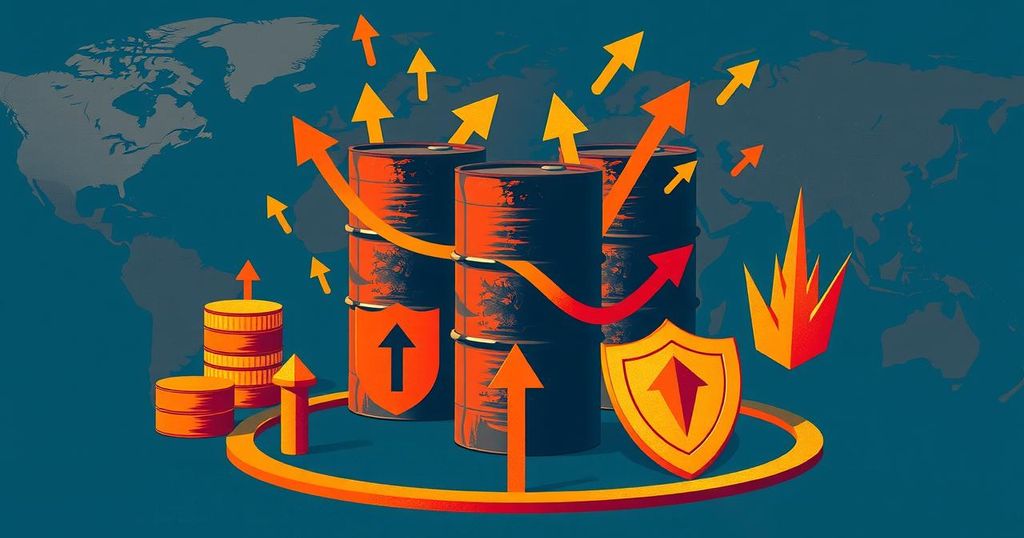World news
ASIA, BIDEN ADMINISTRATION, EUROPE, EUROPE/ASIA, GASOLINE PRICES, GEOPOLITICS, IRAN, KRISTEN WELKER, NATIONAL SECURITY, NORTH AMERICA, POLITICS, PUTIN, RUSSIA, TRUMP, UKRAINE, UNITED STATES, US PRESIDENTIAL RACE, VLADIMIR V, VLADIMIR V. PUTIN, WELKER, WHITE HOUSE, ZELENSKY
David O'Sullivan
0 Comments
Trump’s Strong Words Against Putin: Threat of Secondary Tariffs on Russian Oil
President Trump criticized President Putin, threatening secondary tariffs on Russian oil if negotiations for Ukraine peace fail. He indicated tariffs could trigger immediately if Russia is deemed responsible for impeding progress. Trump’s comments also suggested potential tariffs against Iran for nuclear discussions. Concerns regarding enforcement of such measures have been raised by experts.
On Sunday, President Trump publicly criticized Russian President Vladimir V. Putin, threatening to implement secondary tariffs on Russian oil if negotiations to end hostilities in Ukraine fail. During an appearance on “Meet the Press,” host Kristen Welker conveyed Trump’s intent, revealing his intentions to impose tariffs of 25 to 50 percent on Russian oil “at any moment” if he perceives Russia as responsible for obstructing peace efforts.
This marked the most significant denunciation from Trump regarding Putin, a departure from his earlier alignment with the Russian leader. Trump has frequently avoided explicitly identifying Russia as the aggressor in Ukraine, and these latest comments indicate escalating frustration over the stalled negotiations. He stated, “If I think it was Russia’s fault, I am going to put secondary tariffs on oil, on all oil coming out of Russia.”
In addition to targeting Russia, Trump also mentioned the potential for similar tariffs against Iran should they hinder negotiations related to their nuclear program. He expressed anger toward Putin for questioning the credibility of Ukrainian President Volodymyr Zelensky, stating such comments would prolong the diplomatic process, indicating that new leadership in Ukraine would complicate peace talks. “New leadership means you’re not going to have a deal for a long time, right?” Trump remarked.
While Russia and Ukraine have agreed to a limited ceasefire, it has not been robust enough to meet U.S. expectations for substantial cessation of combat. Meanwhile, Trump highlighted the possibility of military action against Iran should negotiations fail, suggesting the American response could be significant: “If they don’t make a deal, there will be bombing. It will be bombing the likes of which they have never seen before.”
This discussion follows Trump’s recent executive order targeting nations purchasing oil from Venezuela, designed to impose tariffs on those countries. Experts raised concerns regarding the enforcement of current sanctions, questioning the feasibility of implementing additional tariff measures effectively. Trump’s remarks illustrate his strategy of leveraging economic pressure as a tool in foreign relations, particularly aimed at regimes like those in Russia and Iran.
In summary, President Trump’s latest statements indicate a marked shift towards a more confrontational stance against both Russia and Iran. By threatening secondary tariffs on Russian oil, he emphasizes his commitment to imposing economic pressure to achieve foreign policy objectives. Additionally, Trump’s remarks signal growing frustration with stalled peace negotiations in Ukraine and hint at potential military actions if diplomatic efforts regarding Iran do not succeed. The effectiveness of these potential measures, however, remains uncertain amid existing enforcement challenges.
Original Source: www.nytimes.com




Post Comment